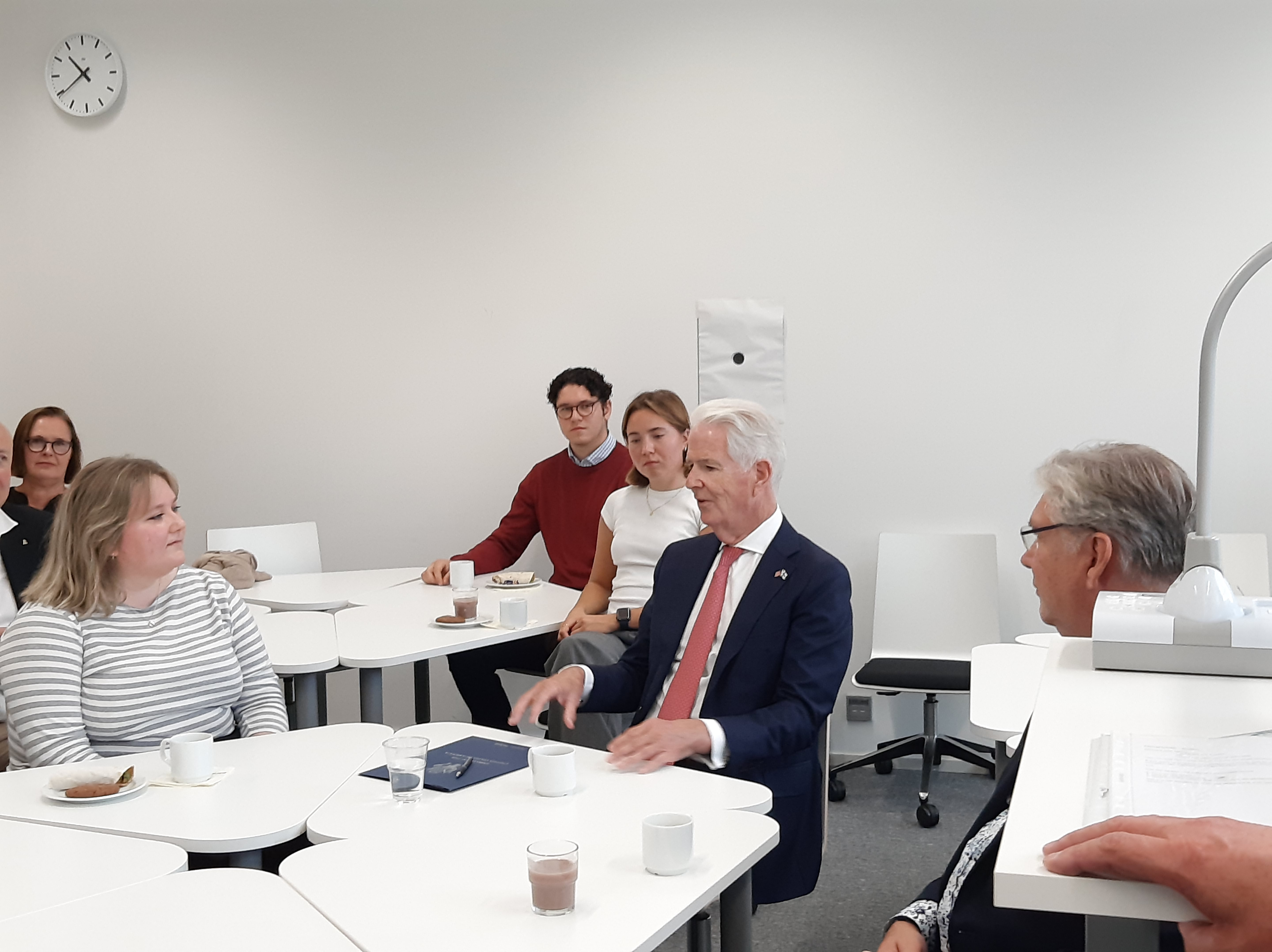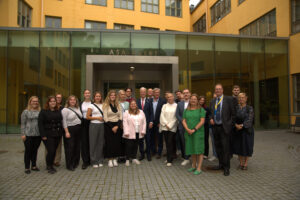1.9.2023
US Ambassador visits Åbo Akademi University for a discussion with students
On Friday 1 September, US Ambassador Douglas Hickey visited Åbo Akademi University to talk to about ten students before taking part in the discussion “Transatlantic Finland and European geopolitics” at this year’s Europe Forum.
The visit to Åbo Akademi took place on Ambassador Douglas Hickey’s own initiative. The Ambassador wanted to discuss with students current issues that may have been overshadowed by the military aspects of Finland’s NATO membership.
“I always try to visit universities whenever I can, it is important to see how things work in other countries. Finland and the United States also have good relations in the field of education. Relations between Finland and the United States are also at the top level,” says Hickey.
Ambassador Hickey did not choose the position in Finland himself, but was offered the position by President Joe Biden. In retrospect, he is glad he accepted the offer. With a background in the technology sector, Finland proved to be a good fit.
“With a population of 5.6 million, it’s amazing what Finland has achieved in areas such as green technology and telecommunications,” says Hickey.
Finland has high quality engineering education and globally there are not enough engineers being trained, and there will probably be competition for the engineers that are available, according to Ambassador Hickey. Finland’s entry into NATO has also made investors more interested in Finland. Slush, for example, expects significantly more investors from the US and the UK this year than previously. Hickey emphasizes that NATO is not just about military cooperation. Finland’s entry into the alliance has also strengthened its economic ties with the US and other member states.
According to Hickey, Finland has been good at helping start-up companies get off the ground. However, they have not been as good at helping them grow, and many have been acquired by American companies, for example. He is convinced that American companies will want to invest in Finland in the future.
Hickey speculates that a similar ecosystem of lawyers and investment companies may eventually emerge as in Silicon Valley, for example. All the ingredients are actually already there. Investors have also been leaving China at an increasing rate due to the country’s crackdown on foreign companies and lack of respect for intellectual property rights.

Food security, a pillar of development
Food security, an issue many seem unaware of, is one that Hickey wanted to highlight. Russia’s invasion of Ukraine has raised the issue of food security as many African countries have imported grain from Ukraine and Russia. Many African leaders feel that they have been betrayed by Russia, says Hickey. “It’s particularly disgusting that the profits Russia makes from increased grain export revenues are being used to fund the war that drove up prices in the first place,” he adds.
“It is estimated that global food production will have to increase by up to 60 per cent by 2050 and new technologies will be crucial,” says Hickey. New and more efficient irrigation systems are an important aspect. One example is Israel, which has been very successful in expanding its food production using new technologies. Vertical farming in cities is also a promising way to make food production more efficient. Not only does it look beautiful, it also uses less water and pesticides, and shortens transport distances, says Hickey.
Genetically modified crops are also something that will be necessary to expand food production. GMOs are not without controversy, but much of it is due to the behavior of the companies that developed the GM crops. “Not everything can be driven by the profit motive,” says Hickey. This includes the development, production and distribution of vaccines, he adds.
Food safety is the basis for education and development, says Hickey. “You don’t develop an education, research and development sector if the food situation is uncertain. For example, the rapid development of vaccines against COVID-19 was possible thanks to long-term investments in research and technology.

Finnish presidential candidates are good for relations with the US
Both the United States and Finland have presidential elections in 2024. Douglas Hickey was involved in President Biden’s 2020 campaign, with both candidates spending around $1 billion on their respective campaigns. In comparison, President Sauli Niinistö spent around €1.5 million on his 2017 campaign. “We have a lot to learn from Finland,” Hickey says with a laugh. Unfortunately, the trend seems to be the opposite. Hickey believes that the Finnish presidential candidates are good for relations with the US, and he does not want to speculate on who will be elected.
Hickey also praises the current US administration for keeping NATO and its allies together during Russia’s war in Ukraine. The further away from the center of events, the less you tend to care. That’s why it’s important for delegations from North America and Western Europe to visit Finland, the Baltics and Poland, for example.
Hickey concludes by saying that we need to focus on the Arctic in the future and advises students to think about how they take the Arctic into account in their studies and future careers. After the discussion, Hickey says that he had a good impression of Åbo Akademi University, and that the discussion was good and rewarding.
“I like discussing with students and I often learn a lot from listening to them,” he concludes.
